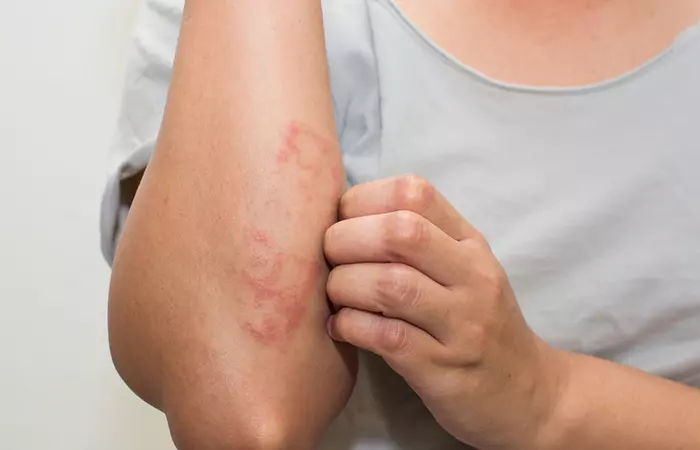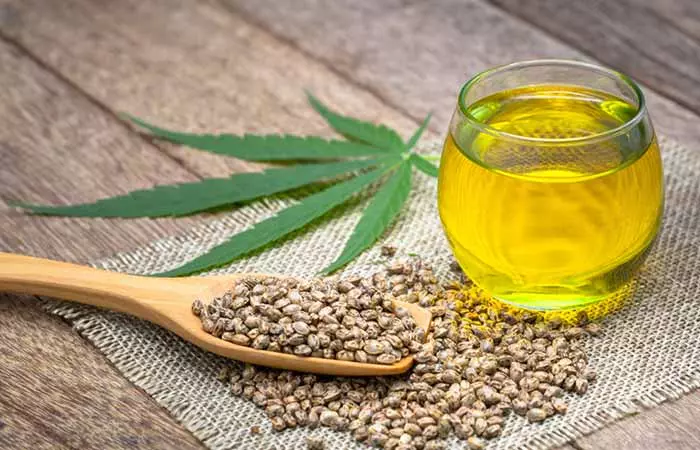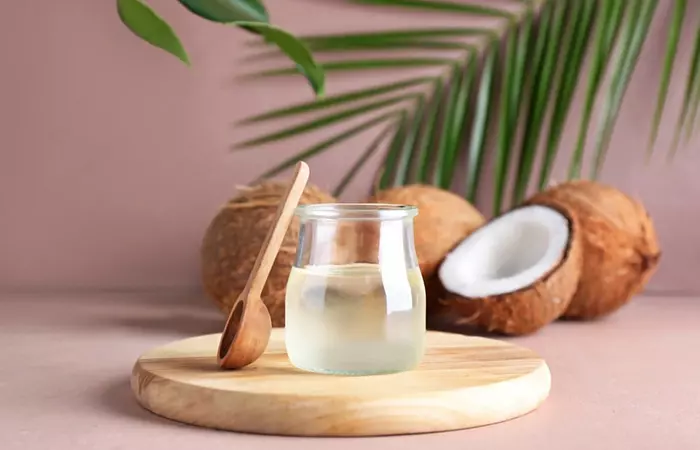A cross-sectional study that was conducted to determine the prevalence of atopic dermatitis in the population of the United States revealed an average prevalence percentage of 7.3%, as indicated by results from 1,278 participating adults. In terms of intensity of the disease, 60.1% had mild, 28.9% had moderate, and 11% had severe forms of the disease. This article talks about how to treat eczema scars with efficient home treatments and techniques. Keep reading to find out more!
Can Eczema Leave Behind Scars?
Usually, eczema does not cause scarring. However, some complications may lead to scarring. Eczema is an inflammatory condition that affects the epidermis (top layer of the skin). You may develop itchy, red patches and blisters during flare-ups. However, once the flare-up subsides with proper treatment, the epidermis can rebuild itself. This means your skin heals without any scars and marks. However, eczematic patches can thicken if left undiagnosed and untreated, especially in body parts like your elbows, wrists, knees, and ankles. Further scratching may also injure the skin and cause a bacterial infection that may affect the deeper skin layers. As a result, you may develop scars. You may also experience skin depigmentation on the injury site that may become darker than the surrounding skin and leave visible marks. From environmental factors to underlying health issues – anything can trigger an eczema flare-up. Some common factors include:
Extreme weather conditions Dust mites and mold Clothes made of wool, polyester, and nylon Pollen Household cleaners and laundry detergents Tobacco Chlorine in swimming pools Sun exposure Some ingredients or chemicals in skin care products
10 At-Home Remedies To Improve Eczema Scars
While dealing with eczema is a challenge in itself, the pigmented marks they leave behind can be equally troublesome. So if you have often wondered how to prevent scarring during flare-ups, the following list of home remedies can be your solution.
1. Oatmeal Bath
Colloidal oats contain compounds called avenanthramides, which are powerful antioxidants with anti-inflammatory properties. Colloidal oats extract stimulates the production of anti-inflammatory transforming growth factor β1 (TGFβ1) to reduce skin dryness, redness, scaling, itching, and erythema caused by eczema (2). You can boil rolled and powdered oats and massage the affected area with it. Alternatively, you can prepare a warm soak or oatmeal bath. You Will Need
1-2 cups of powdered oatmeal
Method Note: Avoid oatmeal bath if you are allergic to gluten. Start with applying soaked oatmeal to a limited area like the upper arm to test for hypersensitivity.
2. Chamomile
Chamomile extract is used in topical creams to soothe eczema symptoms. It has similar effects as steroidal creams in calming eczema flare-ups (2). You can prepare chamomile-infused oil to prevent eczema flare-ups and minimize scars. You Will Need
A cup of dried chamomile flowers 2 cups of sweet almond oil (you may use apricot kernel or cold-pressed sunflower oil) A glass jar
Method Note: Avoid using chamomile if you are allergic to daisies. Do a patch test before using the oil.
3. Aloe Vera
Aloe vera has anti-inflammatory, antioxidant, and antimicrobial properties. It is used topically for wound healing, soothing inflamed skin, and psoriasisi A long-term skin condition that causes itchy skin, rashes, and scaly patches due to systemic inflammation. (2). Aloe vera has hydrating properties and can minimize dryness and discomfort caused by eczema patches. It can soften the skin, accelerate wound healing, and reduce the chances of scarring while also minimizing old scars. You Will Need
2-3 tablespoons of fresh aloe vera gel
Method Use fresh gel scooped from an aloe leaf. If not available, use store-bought pure aloe vera gel. However, do a patch test to avoid allergic reactions. A blogger shared that her eczema improved considerably and disappeared eventually after using aloe vera for three weeks. In the beginning, she experienced some itching and discomfort when applying the aloe but by the second week, her eczema was almost back to normal and disappeared by the third week. In her blog, she wrote, “The color around the area is almost back to normal and there’s no itchiness nor discomfort (i).”
4. Turmeric
Turmeric is hailed for its medicinal properties and is beneficial in both oral and topical forms. Fresh turmeric juice is used to soothe skin conditions like eczema, scabies, allergic reactions, shinglesi A viral infection with painful rashes caused when the chicken pox virus is reactivated in the body. , and chickenpox. It contains curcumin, a compound that has anti-inflammatory and bactericidal properties (2). It can soothe eczema symptoms, minimizing the chances of developing eczema scars, and combats hyperpigmentation. You Will Need
1 teaspoon of honey A pinch of turmeric powder or ½ teaspoon of raw turmeric paste
Method
5. Manuka Honey
Honey is used in traditional Persian, Ayurvedic, and Quranic medicine for treating wounds, inflammation, eczema, and other skin issues. Medical-grade honey and Manuka honey are commonly used in clinical wound care practices around the globe. It has skin healing ability and has antimicrobial properties. There is not enough evidence to prove its efficacy in soothing eczema. However, it exerts emollienti Moisturizing property that helps smoothen the skin by forming a protective film on the skin. , humectant, and skin-soothing effects, which may help minimize the discomfort caused by eczema symptoms and prevent scarring (3). You Will Need
2-3 teaspoons of pure Manuka honey
Method Note: Avoid using honey if you are allergic to pollen.
6. Apple Cider Vinegar
There are no studies to prove the beneficial effects of ACV for eczema management. It does not have any significant impact on the skin barrier integrity (4). However, diluted ACV is widely used as a DIY remedy to soothe eczema flare-ups. While this is not a recommended method and may even cause minor side effects like itching, follow the recipe if you want to give it a try. You Will Need
2-3 tablespoons of pure ACV (with mother) 2-3 tablespoons of water Cotton or gauze wraps
Method
7. Cocoa Butter
The FDA recognizes pure cocoa butter to have skin-protecting properties (5). While no scientific proof demonstrates cocoa butter’s efficacy in relieving eczema-related symptoms, it can be used as an emollienti Moisturizing property that helps smoothen the skin by forming a protective film on the skin. to keep the area moisturized and prevent scarring. You Will Need
1-2 tablespoons of pure cocoa butter
Method
8. Hempseed Oil
Dietary hempseed oil possesses anti-inflammatory properties and can improve the clinical symptoms of atopic dermatitis. It contains essential fatty acids (EFAs) like linoleic, alpha-linoleic, and gamma-linoleic acids. It can relieve symptoms like dryness and itchiness and improve skin moisture levels. These properties may also help soothe eczema discomfort, relieve itching and prevent scarring (6), (7). You can use hempseed oil topically and orally. You Will Need
1-2 tablespoons of hempseed oil 1 tablespoon of coconut oil (or any other carrier oil)
Method
9. Shea Butter
Shea butter contains vitamins A and E and works well as an emollienti Moisturizing property that helps smoothen the skin by forming a protective film on the skin. and skin moisturizer (8). It may help keep the affected area moisturized, reduce itching and dryness, and prevent the chances of developing eczema scars. Shea butter is widely used in skin lotions and creams for its hydrating and skin-softening properties. You Will Need
½ cup of shea butter ½ cup of vegetable oil (coconut, safflower, almond, or avocado oils) A glass jar
Method
10. Virgin Coconut Oil
Virgin coconut oil is highly beneficial in soothing eczematic skin conditions (like atopic dermatitis). It reduces skin dryness by preventing trans-epidermal water lossi The loss of water from the skin layer of an animal or plant to the external environment, where it evaporates. (TEWL), relieving symptoms like flaking and itchiness (9). You Will Need
1 cup of virgin coconut oil 2-3 drops of any essential oil (optional) Glass jar
Method
Treatment For Eczema Scars
The first line of treatment for eczema scars is preventing them from aggravating. This is where doctors generally prescribe topical corticosteroids (10). Along with this, you should moisturize your skin regularly and avoid scratching to prevent any dark spots. Your doctor may prescribe sedating antihistamines in case you experience severe itching that hinders your sleep (10). But if you still develop scars despite all these measures, your dermatologist may recommend topical retinoids. These help promote collagen production and skin cell turnover to reduce scarring and pigmentation (11). You may also opt for clinical procedures like laser therapy and chemical peels. However, remember that not all kinds of scars need clinical treatments. A dermatologist can recommend the most suitable options depending on the severity of your eczema scars. Will skin discoloration from eczema go away? Yes, skin discoloration from eczema can go away. However, it takes approximately 6-8 months for it to fade away completely. For some people, it may even take up to a year. Why does eczema leave white patches? Eczema causes white patches as the affected skin is irritated and forms a patch that is lighter in pigment than the surrounding skin. Is Vaseline good for eczema? Yes, Vaseline is good for eczema. It has soothing and moisturizing properties that help manage irritation, redness, and discomfort.
Illustration: Eczema Scars: 10 Effective Ways To Improve Their Appearance
Learn how to remove eczema scars in this easy-to-follow process! Watch the video below to get rid of pesky scars and restore your skin’s natural beauty.












